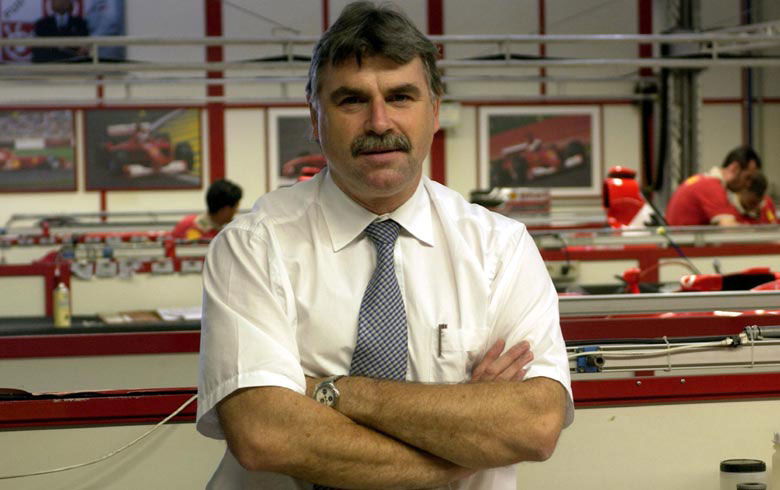Feature: Dieter Gundel, Ferrari's electronics wiz.
Dieter Gundel - as his name would suggest, Ferrari's electronics and control software engineer is another of the growing band of key international figures that have made the legendary Italian team so successful in recent years.
The German born Gundel joined Ferrari three-and-a-half years ago and now plays a vital role overseeing the sophisticated electronics systems of the car at every race and test session the team takes part in.

Dieter Gundel - as his name would suggest, Ferrari's electronics and control software engineer is another of the growing band of key international figures that have made the legendary Italian team so successful in recent years.
The German born Gundel joined Ferrari three-and-a-half years ago and now plays a vital role overseeing the sophisticated electronics systems of the car at every race and test session the team takes part in.
A former university physicist, Gundel was unlike many people working in motor racing, and not a dedicated fan of the sport who then turned his dream into his job. "Like most people, I quit the university to go into industry for the increased financial rewards," admits Gundel. "I started with Bosche in the mid 1980's and then moved on to the TAG engine program, TAG electronics, and then into Ferrari," he says. "I am not a racing enthusiast as such, but at the same time I get a lot of pride and job satisfaction when I see the car win a race knowing that it is helped in a large part by the electronic control systems that I have helped develop for the car."
In recent years, that has gone from a few simple control systems to a huge range that affect just about every aspect of the car that is allowed to be aided electronically. "The half a dozen different control units working on the car have more capacity than that of a big IBM computer a decade ago," explains Dieter, who downloads all that information (around 500 megabytes of it) from a central point on the car after each run for analysis both at the track and by some half a dozen engineers back at the factory.
"From the analysis of the information we collect, the engineers then decide upon what specific changes they will make to the car." The process is now so sophisticated, that many of the control systems can be automated, but as Dieter points out, the driver still plays a very essential role in what goes on around the track. "The driver is the best sensor we have," he says, for it his feedback that ultimately decides what software and other electronic changes should be made to the cars.
"Things like traction control, differential adjustments or engine power are things that can vary considerably with tyre wear and temperatures etc. and the driver is the best judge of what is needed. At some circuits he might make adjustments every lap to different aspects of the car that might be improved on a specific corner. That would be impossible to do automatically and always get it right," he says.
Is there a risk that these complicated systems can go wrong and even cause an accident? "You can never say never," Dieter points out, "but it has never happened to us and there is very little possibility that a system could go haywire during a race. Sometime they can stop working for one reason or another but is never a safety issue. Every system is thoroughly tested on the test bench before it gets on the car and the track and really critical systems like the throttle control system have fail-safe back-ups that would not allow a throttle to stick open."
Like all electronics wizards, Dieter was disappointed to see the two-way telemetry function between the car and pit banned from the start of this season. "The biggest advantage of keeping it would be to diagnose and bi-pass any problems that come up during the race which would certainly enhance the safety aspect," he points out.
Like all engineers, specifically those like Dieter, who are involved in interfacing sophisticated control systems in the harsh environment of a Formula One car, it is a job for which there is always room for improvement as not only technology improves, but as he finds better ways of doing the job. "I have to understand a lot of areas of the car to help me know what the engineers or driver wants from a particular aspect of it," he explains. It is also important for a driver to understand all that is available to him. Gundel will then spend the days between races fine tuning the software for those systems or developing completely new ones.
"Monza is going to be a very tough test after Hungary because of the testing ban during the summer. We now have a back-log of new things to test that have been developed over the past few weeks," he points out. During the year he and his team will develop around 200 new software versions and test around twelve at every test session. It's hardly surprising that Ferrari need a full time test driver as well as their two regular drivers who also test constantly in order to stay on top of the changes.
While regulation changes might be able to slow the incredible progress made in electronic systems used on Formula One cars over the past decade, it can never halt it; at least not as long as there are men like Dieter Gundel who would be just at home working on the electronic systems of a sophisticated jet fighter. In fact, he would probably be more at home, at least on the weekends that is.
